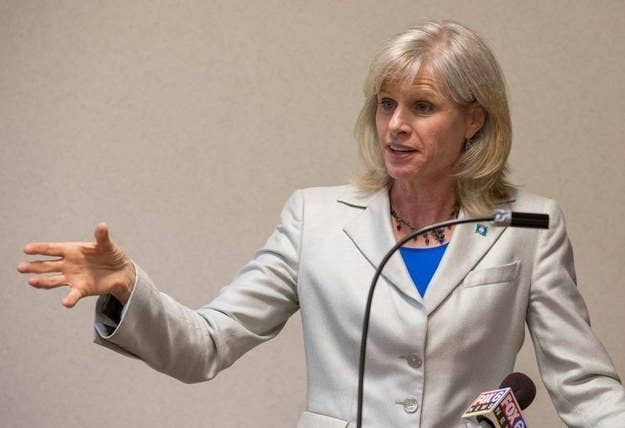
Mary Burke is running for governor in Wisconsin. When you pull up her economic plan, you get 35 pages of text, 59 instances of the first person singular pronoun, charts, and an opening letter from her.
"I hope you'll take the time to read the whole plan. You see, I'm a businessperson, so I view this as a starting point," she writes.
"This plan isn't just for the campaign — it's the playbook I'll look to the day I'm sworn in as your governor."
This document contains sentences copied from: a Tennessee Democrat's plan, Gov. Jack Markell's campaign, the White House, Gov. Terry McAuliffe's 2009 campaign, an Indiana Democrat's campaign, and a Harvard report. It's like little Russian nesting dolls hopping out with talking points.
The campaign fired the "expert" who wrote the report. But this plagiarism isn't unique to Mary Burke's campaign. The Republican nominee for Senate in Oregon did the same thing with her health plan. A Republican Senate candidate in Oklahoma copied parts of his issues pages from others, and a Democrat in Florida running for Congress copied parts of her issues page. Eight Republicans plagiarized from Sen. Rand Paul's issues page. And Paul plagiarized three pages of his recent book and in a number of newspaper columns.
In a particularly bizarre example, the Democrat running for South Dakota's governorship actually copied a biographical sentence from Burke. Apparently, both Burke and South Dakota's Susan Wismer know "how to make responsible decisions that keep a balance sheet in the black while creating jobs because she's spent her career doing it." It's a generic sentence, but it's also about, you know, her life.
The campaign took down the page. But the candidate dismissed the plagiarism: "This isn't academia. This is politics," she told the Argus Leader. "We all do what we can to save time."
Burke called her campaign's plagiarism "wrong," but downplayed it, too — "very small passages," "extremely limited," "scattered throughout." Paul originally blamed the plagiarism episode on "hacks and haters" before conceding his staff had been "sloppy" and changing procedures.
Over the past year, BuzzFeed News's unstoppable Andrew Kaczynski has found plagiarism on campaign websites everywhere — left, right, senate, gubernatorial, state legislature. It's rarely grandiose. We're not talking about speeches given before joint sessions of Congress. No one is going to pitch himself into a fire because Monica Wehby, the Oregon Senate candidate, copied from a Crossroads health survey. But it is: basic, casual, lazy, and widespread.
Andrew has a couple different ways he finds plagiarism, but it generally requires hours of tedious work organizing the material, checking it, and sorting through false positives. The truth is: He's probably putting more work into these plans and issues pages than some of the people who write them.
This is the state of U.S. politics in 2014: The intellectual infrastructure around candidates is so weak that consultants don't write their candidates' own issues pages. Instead, they scavenge and reconstruct from old campaigns and articles, popping a sentence here, loosely rephrasing a paragraph there. The candidates and their aides appear to operate under the belief that the expectation for this kind of material is that it's meaningless bullshit.
Can you really blame them, then? Yes. They are seeking policymaking positions and their websites are the most important and most accessible places where they make policy commitments. These policy statements are, arguably, the most important things they write.
Burke used to be an executive at the Trek Bicycle Corporation, which her family owns. She tells voters she knows about creating jobs. She's supposed to know about jobs. Wehby, Oregon's Republican Senate candidate, is a doctor. She's supposed to know about health care. That's HER THING.
Some might dismiss this merely as an instance of lazy p.r. tradecraft, and the consultant who "plagiarized" his own talking points has been fired for it. But it tells us nothing about Burke that distinguishes her from any other major gubernatorial candidate in the country.
And — whoops, wait, sorry. Brian Beutler, in an unusual dismissal of policy in what used to be one of the country's most important policy outlets, wrote that last paragraph for The New Republic last week. I just copied and pasted it here for the hell of it. He's right that it doesn't necessarily tell us much about Burke personally.
Beutler and other apologists argue this is more like "message discipline working a little bit too well," saying it's something less than a major speech or a thesis being plagiarized. He isn't alone; on Twitter, others in both parties (depending mostly on whose candidate has been caught) laugh off Andrew's findings.
There are two answers to this. First, that plagiarism is an act of dishonesty. It misleads the reader. It presents information, possibly left unchecked and free from its original context, as good. This is a standard we have for journalists — it's a standard we have for high school students.
Otherwise, why post issues pages at all? Why put together jobs plans and health care plans? Why make them 35 pages long? This isn't sixth period history class — no one requires candidates to do these things. Candidates do this to indicate that they have ideas, and ideally to commit to them; the plagiarism suggests, similarly, that they actually don't.
This indulges the worst of political hackery. It's based, often, on a spoken or unspoken view that the press and the people don't really care about policy or campaign policy commitments. And this is a particularly bizarre time to make that argument: The Obama administration has been shaped by huge fights over policy — health care, immigration, coal and fracking and emissions — and many of those originated with commitments Obama made during his 2008 campaign.
